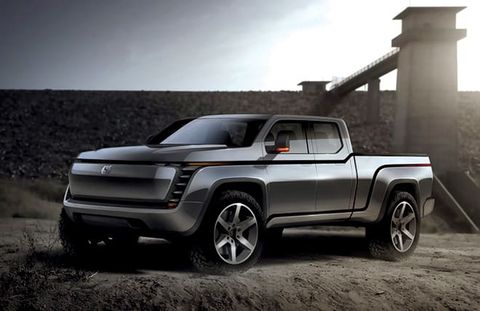What started as a niche concept is now a fast-growing segment of the automotive industry. As technology improves and consumer demand shifts toward greener alternatives, automakers are prioritizing electric trucks, blending rugged capability with modern technology.

Why Electric Pickup Trucks Matter
Electric pickup trucks are gaining relevance not only because of environmental concerns but also because of economic and technological shifts. Here’s why they matter today:
1. Environmental Benefits
-
Zero Tailpipe Emissions: Reduces carbon footprint and improves air quality.
-
Sustainable Energy Use: Can be charged using solar or other renewable sources.
-
Lower Noise Pollution: Quieter than traditional engines.
2. Cost Efficiency
-
Reduced Fuel Costs: Electricity is generally cheaper than gasoline or diesel.
- Lower Maintenance: Fewer moving parts mean fewer breakdowns and less servicing.
3. Who Benefits?
-
Individual Consumers: Especially those looking for sustainable alternatives without compromising performance.
-
Businesses: Companies can reduce fleet fuel costs and meet sustainability goals.
-
Rural and Urban Users: Suitable for a variety of terrains and distances.
4. Solving Long-Standing Issues
-
Fuel Dependence: Reduces reliance on fossil fuels.
-
Urban Emissions: Helps meet air quality goals in cities.
-
Vehicle Innovation: Brings new tech features like over-the-air updates and advanced driver-assistance systems (ADAS).
Recent Trends and Developments
The electric pickup landscape has changed significantly over the past year. Here are some key developments:
Rising Model Availability
-
2024 Ford F-150 Lightning: Gained attention for its power, range (~320 miles), and onboard power station feature.
-
2024 Rivian R1T: Offers all-terrain capability and multiple drive modes.
-
2025 Tesla Cybertruck: Production began in late 2024 with a focus on futuristic design and bulletproof body panels.
-
Chevrolet Silverado EV: Officially launched in mid-2024 with up to 400 miles of range.
Battery Innovations
-
Solid-State Batteries: Several automakers announced R&D successes; promises faster charging and higher energy density.
- Extended Range: More trucks now exceed 300 miles per charge once considered a key barrier.
Charging Infrastructure Expansion
2024 U.S. Government Funding: Over $7.5 billion invested in public EV chargers, particularly fast-charging networks along highways.
Tech Advancements
-
Vehicle-to-Load (V2L): Trucks like the F-150 Lightning can power homes, tools, and appliances.
-
Autonomous Features: ADAS packages now include lane centering, adaptive cruise, and even hands-free highway driving in some models.
Government Policies and Incentives
Electric pickup trucks are shaped by national and regional laws. Understanding the policy landscape helps consumers make informed decisions.
United States
Federal Tax Credit: Eligible EVs may qualify for up to $7,500 in tax incentives under the Inflation Reduction Act (IRA), depending on vehicle origin and battery material sourcing.
State-Level Rebates: States like California, Colorado, and New Jersey offer additional rebates of $2,000–$5,000 for qualifying EVs.
EPA Regulations: Stricter emission standards encourage automakers to produce cleaner vehicles, including electric trucks.
European Union
Zero-Emission Zones: Cities like London restrict fossil fuel vehicles in certain areas, pushing adoption of electric trucks for urban deliveries.
Corporate Fleets Mandate: Regulations encourage businesses to electrify commercial fleets.
India and Asia-Pacific
FAME II Scheme (India): Provides financial incentives for commercial EV purchases, including light-duty electric trucks.
Charging Infrastructure Push: Multiple countries announced plans for expanding EV charging networks to support wider adoption.
Tools and Resources for EV Truck Owners
There are several tools, apps, and platforms that help users transition smoothly to electric pickup trucks:
Charging and Route Planning
PlugShare: Map of global charging stations with reviews and filters.
A Better Route Planner (ABRP): Customizes EV-friendly road trips based on vehicle model, range, and charger availability.
Cost Calculators
Department of Energy EV Tool (U.S.): Compare costs of EVs vs. gas vehicles including fuel and maintenance savings.
Kelley Blue Book: EV comparison charts with long-term ownership costs.
Home Charging Solutions
ChargePoint Home Flex: Smart charger compatible with various EV truck models.
Tesla Wall Connector: Efficient home charging for Tesla Cybertruck.
Government Portals
FuelEconomy.gov (U.S.): Official guide to tax credits and vehicle energy use.
EU EV Info Portal: Incentives and rules by country.
Frequently Asked Questions
1. How far can electric pickup trucks go on a single charge?
Most 2024–2025 models offer between 250 to 400 miles of range depending on the battery size and usage. For example, the Silverado EV offers up to 400 miles, while the Rivian R1T averages around 314 miles.
2. Can electric trucks tow and haul like gas-powered ones?
Yes. Electric pickups like the F-150 Lightning can tow up to 10,000 pounds. Torque delivery is instant in EVs, making them well-suited for towing and off-road tasks.
3. Are charging stations widely available?
Infrastructure is rapidly growing. In the U.S., there are over 160,000 public charging stations as of mid-2025, with major investments still ongoing. Fast chargers are increasingly common on highways.
4. How long does it take to charge an electric truck?
It varies by charger:
Level 1 (home outlet): Up to 3–5 miles of range per hour.
Level 2 (home or public): 20–30 miles of range per hour.
DC Fast Charging: Can add 100+ miles in about 30 minutes for most trucks.
Electric Pickup Truck Comparison
| Model | Max Range (mi) | Towing Capacity (lbs) | Notable Feature |
|---|---|---|---|
| Ford F-150 Lightning | 320 | 10,000 | Power backup for homes |
| Rivian R1T | 314 | 11,000 | All-terrain drive modes |
| Tesla Cybertruck | 340–500 | 11,000 | Bulletproof exterior, futuristic UI |
| Chevy Silverado EV | 400 | 10,000 | Four-wheel steering, large bed |
Final Thoughts
Electric pickup trucks represent a major shift in how we think about work vehicles and personal transportation. Their ability to combine rugged utility with clean energy and cutting-edge technology makes them a compelling option for today’s drivers. With ongoing advances in range, battery tech, charging infrastructure, and government support, electric trucks are no longer a vision of the future—they are an essential part of the present.
Whether you're a business looking to green your fleet or an individual interested in sustainable power without sacrificing performance, understanding the landscape of electric pickup trucks equips you to make smarter, more informed choices.

